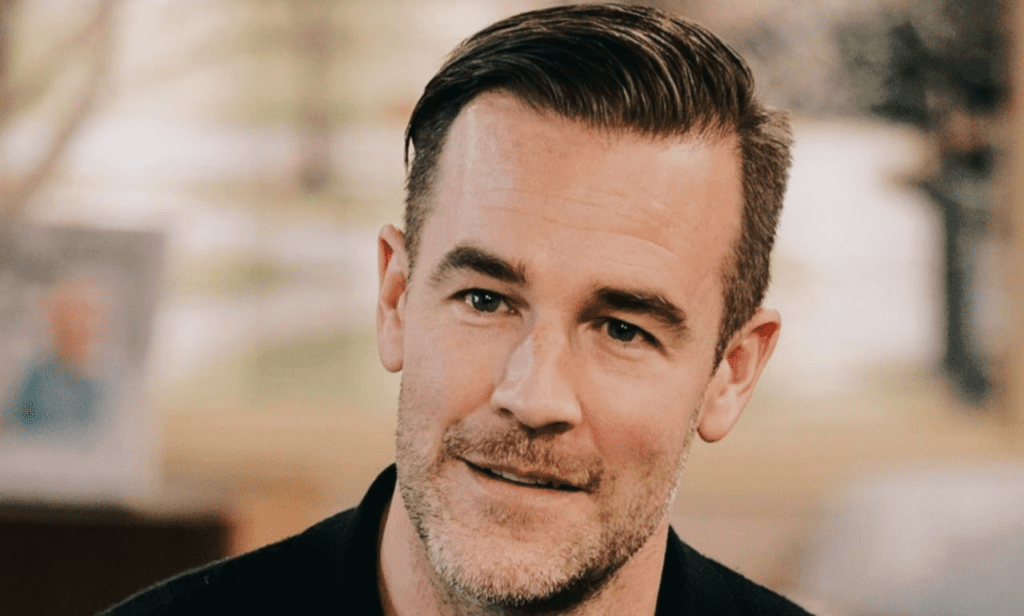
James Van Der Beek, known for his iconic role in “Dawson’s Creek,” recently shared a heartfelt update about his wife Kimberly’s cancer journey, moving fans worldwide with their family’s raw honesty and resilience. The couple, married since 2010 and parents to six children, revealed earlier this year that Kimberly was diagnosed with cancer after experiencing persistent symptoms. In a series of emotional social media posts, James described the shock and fear that gripped their household, emphasizing how swiftly life can pivot from routine to crisis. “One day you’re planning summer vacations; the next, you’re sitting in an oncologist’s office,” he wrote. Their openness about vulnerability—a rarity among celebrities—struck a chord, highlighting universal struggles millions face silently.
Kimberly’s diagnosis followed months of unexplained fatigue and discomfort, initially dismissed as stress-related. After advocating for advanced testing, doctors identified malignant cells. James underscored the critical lesson here: persistent symptoms warrant second opinions. According to the American Cancer Society, early detection improves survival rates by up to 89% for many cancers, yet 1 in 3 patients delays seeking care due to fear or misdiagnosis. Dr. Linda Miles, an oncologist unaffiliated with the family, notes, “Women’s health complaints are often downplayed. Kimberly’s case echoes a systemic gap in healthcare.” The Van Der Beeks’ transparency about medical advocacy has since inspired followers to prioritize self-screening and push for thorough evaluations.
Navigating treatment became a family mission. James temporarily stepped back from acting gigs to support Kimberly through chemotherapy, while their children adapted routines around hospital visits. The actor shared candid moments—shaved heads before hair loss began, late-night ice cream runs after infusions, and tearful kitchen-table pep talks. These glimpses humanized cancer’s emotional toll, contrasting with glossy celebrity narratives. Psychologist Dr. Rachel Kim explains, “Children internalize parental illness deeply. The Van Der Beeks’ approach—normalizing conversations about fear—builds resilience.” Studies show families who openly discuss illness report 40% lower anxiety levels, per Johns Hopkins research.
Finances added another layer of strain. Despite James’s successful career, medical bills mounted. The couple disclosed spending over $200,000 out-of-pocket on treatments not covered by insurance—a reality for 66% of U.S. cancer patients, per Kaiser Family Foundation data. They launched a modest fundraiser for experimental therapies, clarifying, “This isn’t about us; it’s about exposing how broken the system is.” Their advocacy aligns with nonprofits like Cancer Financial Aid Coalition, which aids families drowning in treatment costs. Economist Ben Harris notes, “Medical bankruptcy affects 500,000 Americans yearly. High-profile stories amplify urgent policy needs.”
Kimberly’s current prognosis is hopeful. Recent scans show tumors shrinking, attributed to a combo of immunotherapy and targeted drugs. James celebrated “small wins,” like her return to hiking—a passion paused during chemo. Immunotherapy, which harnesses the body’s immune system to attack cancer cells, boasts a 50% success rate in certain cancers, per the National Cancer Institute. Still, the road remains uncertain. The family avoids definitive timelines, focusing instead on quality of life. “We’ve traded ‘cure’ for ‘manageable,’” James admitted—a mindset shift familiar to chronic illness warriors. Integrative therapies like acupuncture and plant-based nutrition complement Kimberly’s protocol, reflecting trends in oncology where 75% of patients now blend conventional and holistic care.
The family’s spiritual resilience anchors their journey. James, a longtime meditation practitioner, shared daily rituals: morning affirmations, gratitude journals, and “cry breaks” to release tension. Kimberly leans on art therapy, painting vivid canvases that process her experience. Faith communities worldwide now send prayer chains—unsolicited support the couple calls “humbling.” Sociologist Dr. Elena Martinez links such communal care to survival rates: “Patients with robust emotional networks heal faster. Isolation is as lethal as disease.” This ethos birthed their #LoveWarriors initiative, encouraging small acts of kindness for strangers facing illness.
Public reaction overflowed with empathy. Fans flooded social media with personal cancer stories, thanking the couple for destigmatizing suffering. One viral tweet read, “Seeing a ‘90s heartthrob sob in his car made me feel less alone.” Media outlets, however, occasionally crossed boundaries. After a tabloid published unauthorized hospital photos, James condemned invasive coverage: “Illness isn’t content.” His stance sparked debates on celebrity privacy, with advocacy groups like GRACE calling for ethical reporting standards.
Looking ahead, the Van Der Beeks prioritize legacy over outcomes. They’ve drafted “memory letters” for their kids—heartfelt notes if treatment fails—and redesigned their home for accessibility. James still films his podcast between infusions, using his platform to spotlight cancer research gaps. “Survival isn’t just physical; it’s about making meaning,” he reflects. As Kimberly continues treatment, their story evolves from shock to solidarity—a masterclass in turning pain into purpose.
For families facing similar battles, they recommend resources like CancerCare (free counseling) and the Leukemia & Lymphoma Society’s financial aid programs. James’ parting words? “Advocate fiercely, love harder, and never apologize for needing help.”
